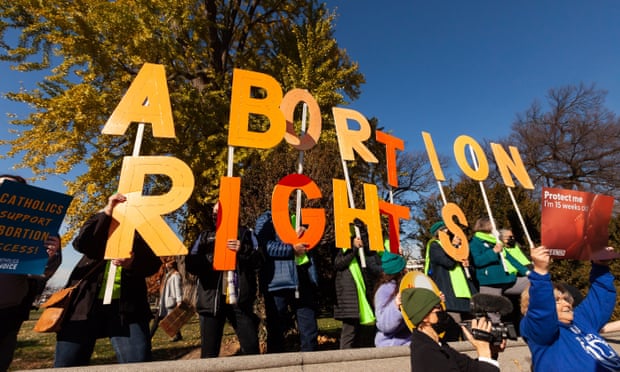Abortion rights advocates vow to fight on after supreme court hearing
Leaders say they will look to statehouses and lower courts if justices allow undermining of Roe v Wade
In the wake of Wednesday’s supreme court hearing in which a majority of justices appeared willing to significantly curb abortion rights, reproductive rights advocates said they would continue to fight in statehouses and lower courts for the right to choose.
The supreme court heard oral arguments in Dobbs v Jackson Women’s Health Organization, widely regarded as the most important abortion rights case in nearly five decades.
The case before the court pits Jackson Women’s Health Organization, Mississippi’s last abortion clinic, also known as the “Pink House”, against the state health director, Dr Thomas Dobbs. A decision is expected in June 2022.
Mississippi intends to ban abortion after 15 weeks of pregnancy, a move blocked so far by lower courts.
While a significant blow to abortion rights is far from a foregone conclusion, questions from the supreme court’s conservative justices on Wednesday appeared to show a willingness to allow restrictions on abortion at 15 weeks and perhaps earlier in a pregnancy.
The case also requests the court overturn Roe v Wade, the landmark 1973 supreme court decision that established a constitutional right to abortion and is the only safeguard for such rights in dozens of conservative US states.
Under present law, pregnant people have a right to terminate a pregnancy up to the point a fetus can survive outside the womb, widely regarded as 24 weeks gestation. A full-term pregnancy is considered 39 weeks gestation.
In a consensus shared across the political spectrum, at least five justices appeared divided over whether to significantly curb or overturn Roe v Wade.
Six of the nine justices lean to the right, with three of them nominated by Donald Trump during his one-term presidency.
“Congress could fix the issue right now,” said Nancy Northup, president and CEO of the Center for Reproductive Rights (CRR), the organization that represented abortion providers in the supreme court on Wednesday.
Although abortion was legalized in 1973 and has been relied upon by women nationally since then, Congress has never affirmed the right to abortion in legislation. That left the Roe v Wade precedent as the principle protection of the option for termination, while anti-abortion campaigners have brought many legal challenges and also pushed laws undermining access to the procedure.
“All these bans and undue burdens in abortion care would be addressed by the Women’s Health Protection Act,” Northup said, referring to a bill recently passed by the US House of Representatives. “That would make sure women can access abortion without unnecessary bans.”
Thus far, the bill has been viewed as highly unlikely to pass into law because it would need to overcome the Senate filibuster rule, requiring a 60-vote majority in the evenly divided chamber, where the Republicans would oppose it.
Joe Biden said on Wednesday: “I support Roe v Wade. I think it’s a rational position to take.”
Julie Rikelman, CRR’s litigation director, who argued before the justices, said campaigners would continue to fight if the supreme court went against reproductive choice.
“We will continue to make every argument we can in the federal courts, we will continue to litigate in the state courts … we will not stop fighting, because it is just too important,” Rikelman said.
Shannon Brewer, the director of the Pink House, said the coming months would be tough, with her providers “sitting and waiting and twiddling our thumbs” in anticipation of a decision.
“It was a difficult day for everybody [but] I listened to the arguments and I think they did a great job at representing women today,” Brewer said.
Following what was widely viewed as a hearing favorable to anti-abortion forces, conservatives chimed in.
“What we want to see is the court do the right thing and overturn Roe,” said Chip Roy, a Republican US representative from Texas. He decried fears over a threat to choice as a “wailing and gnashing of teeth from the left”.
Sam Brownback, the former US ambassador at large for international religious freedom under Trump, said it was time to overturn Roe “and let states address the issue”.
Overturning Roe v Wade would effectively return the issue to be decided at state level, where swaths of the south and midwest would be “certain or likely” to ban most abortion.
Already, several states have banned abortion at six weeks, though all those laws have been blocked by courts, with the prominent exception of Texas.
Some reproductive rights advocates remained optimistic.
Schaunta James-Boyd, co-executive director of Trust Women, an organization dedicated to providing abortions in underserved states, said her group “look[s] forward to a positive outcome later in 2022”.
The pressure to legislate an affirmative right to abortion in states not openly hostile is likely to increase as a supreme court decision nears. While 26 states are “certain or likely” to outlaw abortion if Roe v Wade were overturned, states such as New York and Illinois have worked to protect abortion rights.
Polling shows about six in 10 Americans believe abortion should be legal in “all or most” circumstances.
Meanwhile, the House speaker and California Democrat Nancy Pelosi said: “The House is committed to defending women’s health freedoms and to enshrining into law our House-passed Women’s Health Protection Act, led by Congresswoman Judy Chu, to protect reproductive health care for all women across America.”
She added that the supreme court “has the opportunity and responsibility to honor the constitution, the law and this basic truth: every woman has the constitutional right to basic reproductive healthcare”.

